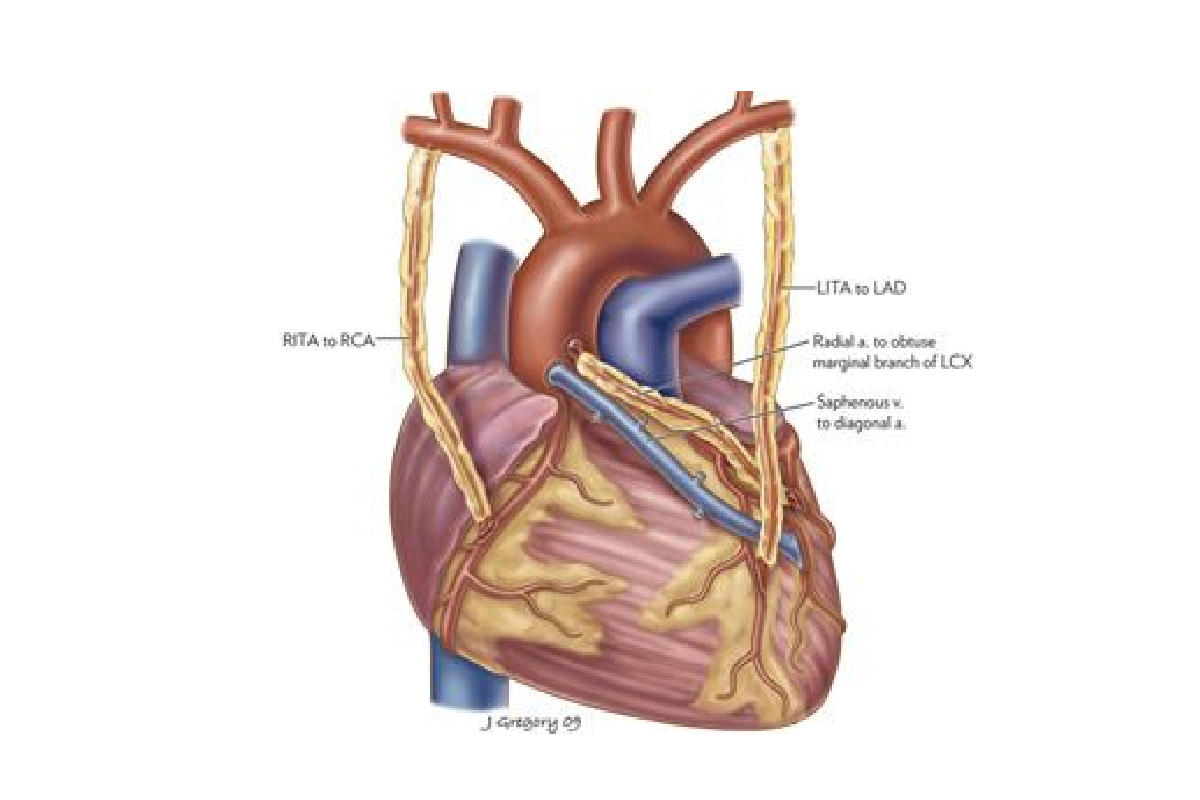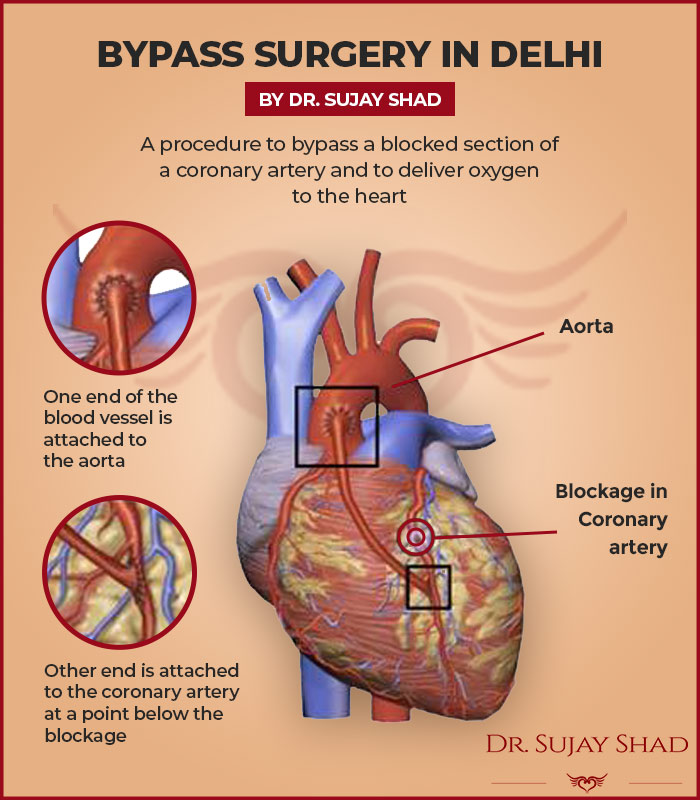
Best Bypass Surgeon in Delhi
Dr. Sujay Shad is one of the best bypass surgeon in Delhi. He has many years of experience in treating heart problems and performs coronary bypass surgery with great care. He works at Sir Ganga Ram Hospital. He utilises the latest and safest methods to help patients recover more quickly. He listens to his patients and gives them the right treatment.
What is Bypass Surgery?
Heart bypass surgery aids in treating coronary heart disease, which occurs when the arteries that carry oxygen-rich blood to your heart muscle (the coronary arteries) become restricted due to a progressive build-up of fatty material inside their walls. The Best Bypass Surgeon in Delhi uses a healthy blood vessel from another body region typically the chest, leg, or arm to bypass the blocked or constricted coronary artery.
A new or repaired blood vessel is created which is known as a graft, and it helps to redirect blood past the restricted section of the artery, improving blood and oxygen delivery to the heart muscle. Dr. Sujay Shad, Best Bypass Surgeon in Delhi at Sir Ganga Ram hospital provides an affordable Bypass Surgery Cost in Delhi.

What Medical condition necessitates bypass surgery?
If you are suffering from coronary artery disease or hypertension, then you may need this procedure. A heart surgery specialist may also advise you to have bypass surgery if:
- There are several blocks present.
- Your left major coronary artery, which provides blood to your left ventricle, is blocked.
- You’ve undergone various operations that didn’t work or caused your artery to get blocked again.
- One of your coronary arteries is diseased, causing your left ventricle (the chamber that does the majority of your heart’s blood pumping) to malfunction.
- You are suffering from significant chest discomfort due to a decreased blood flow to your heart.
What preparation is required before Coronary Bypass surgery?
If the heart doctor suggests heart bypass surgery, it is important to discuss all the advice about preparation. The doctor may recommend several tests to obtain an accurate picture of your heart health.
These tests may include the following:
- Blood Tests
- X-Ray of the Chest
- Electrocardiogram (ECG) (ECG Or EKG)
- Angiogram
Coronary Bypass Surgery: Procedure, Risks and Recovery
Introduction:
Since most people understand a road bypass, that corollary is apt. When a road gets blocked by construction, encroachment, or any other reason that normal traffic can’t flow, authorities construct a new bypass road.
This new road starts from before the traffic hold-up and takes traffic beyond the hold-up. This ensures a smooth flow of traffic.
Coronary arteries are the blood vessels that supply the heart with energy, nutrients, and oxygen. A critical narrowing/blockage in these arteries may lead to a heart attack or other problems. Hence it is essential to keep the heart well supplied with blood.
When an artery of the heart, Coronary artery, develops obstruction or blockage such that blood can’t flow smoothly, surgeons can create a bypass route for smooth flow of blood. Bypass surgery is performed when the coronary arteries are fully or partially blocked.
Procedure:
The basic idea is to create an alternate pathway for the blood to flow through, ensuring adequate blood supply to the heart. This is done by bypassing the coronary arteries using other blood vessels from the patient’s body. The vessels are generally taken from within the chest (LIMA, RIMA), arms (radial artery), or legs and thighs (saphenous vein).These can be safely removed for use in the heart. How the operation will be performed depends on the specific case, and Dr. Sujay Shad, the best bypass surgeon in Delhi, determines that only after a detailed evaluation.
Patients Frequently Asked Concerns:
Risk Associated with Surgery
Over the past 3 decades, bypass surgery has become very efficient and pain-free. Today we have better instruments, better grafts, better surgery and anesthesia techniques, better control of risk factors, and more efficient drugs. Statistically, bypass grafts show excellent results even 15 years after surgery.
However, most people remain concerned about the risks of bypass surgery. About 40 years ago, when techniques were not as refined, many centers around the world would have been satisfied if 60-65% bypass patients survived.
Today we are all aiming that we should have almost 100% survival after bypass surgery. Most centers in India are indeed operating at over 99% success rate, and better hospitals are witnessing a 99.6-99.8% early survival. In essence, this is relatively a safe operation.
Pain after Surgery
All patients suffer pain after the surgery. This is well known for all types of operations. The truth is that chest surgery causes slightly less pain than a belly operation. Pain will make a patient eat less, walk less, talk less, exercise less, sleepless, and some can also become depressed. And I know this very well by closely observing patients over the past 35 years, says Dr. Sujay Shad, the best bypass surgeon in Delhi.
I insist that my patient should not suffer pain after surgery. A pain-free patient (or nearly pain-free patient) is more active from early after surgery and able to enjoy life fully since they start behaving and exercising normally very soon after they don’t suffer complications of inactivity.
Recovery and rehabilitation after surgery
These follow a normal pattern of recovery as after any open chest procedure, and most patients are discharged within 4-6 days after surgery.
Following are some of the recovery guidelines followed by the best bypass surgeon in Delhi, Dr. Sujay Shad.
- First 2 days
All patients are cared for in an intensive care unit for the first two days after surgery. A dedicated specialist cardiac surgery postop care nurse is with the patient 24×7. Monitoring each and every vital parameter and looking after Pulse, BP, variety of pressures from within the heart chambers, lung function whether the patient is breathing by a machine or by their own. Kidney, liver, brain functions, need for blood transfusion and intravenous fluids, etc., are also checked. There is a dedicated Cardiac Surgery and a Cardiac Anesthesia Doctor in the hospital only for Cardiac Surgery patients to supervise the nurses. I am also available around the clock for any issues for which doctors or nurses might seek advice.
- Next 3-5 days
Most patients start to walk to the bathroom before this stage, food progressively becomes more interesting, and they are shifted to the SICU or ward depending upon many clinical factors. While nurses and doctors are always around, this time is spent making patients more and more independent for their daily needs.
- Day of discharge
The patient and their relatives are educated in a rehabilitation class by a rehabilitation expert. All patients learn to get in and out of bed unsupported. Patients are expected to travel home by car, sitting in the front seat with a towel between the chest and seat belt. All patients are asked to climb stairs and not be carried in chairs as makeshift palanquin. (once we make the video link here)
- First Review after a week
Some blood tests, an ECG, and CXR are required at this clinic attendance. Most patients can start short walks in the local parks and increase exercise.
- A month after surgery
Most self-employed people who can control their timings are back to work by this time; people in employment need about 2 months to regain strength.
Bypass surgery Cost in Delhi
To know more about bypass surgery cost in Delhi, please feel free to contact us.
FAQs About Bypass Surgery in Delhi
1. Is coronary bypass surgery a major surgery?
All surgical procedures especially on the heart must be considered major. The heart is vital to a person’s survival as well as quality of life. A cardiac surgeon is uniquely gifted to carry out repairs of the heart, while keeping the heart as well as the rest of the patient alive and well. Coronary bypass doesn’t necessitate opening chambers of the heart, technically this isn’t an open heart surgery and sometimes people think that makes it less major. This is certainly not true; coronary bypass operations must be considered major because a well-performed surgery has a direct bearing on the patient. To know about the bypass surgery cost in Delhi, one must book a consultation with Dr. Sujay Shad at Sir Ganga Ram Hospital.
2. What is the success rate of coronary bypass surgery?
Most good heart centres achieve success rates nearing 99% or more. There are mainly two different sets of patients though:
Elective: that ones who haven’t had a heart attack and have a good heart function
Emergency: who need a bypass surgery soon after a heart attack that has left the heart with muscle damage and poor heart function.
Since we operate on an ageing population, additional comorbidities like diabetes, hypertension, strokes, kidney and liver failure etc also come in the picture. Each of these illnesses can aggravate risk of hospitalisation and surgery.
3. What is the age limit for bypass surgery?
Having operated on some patients who are well over ninety, I can confirm that many older patients can be operated safely. There is however a rider; that patient fitness for surgery must be assessed in detail.
Most elderly patients have other illnesses and poor muscle strength. Both these factors are very important for a smooth surgery and also for the initial days, weeks and months of recovery.
A particular weak, frail elderly person may not be best suited for any cardiac surgery and we will then seek alternate medical/ interventional treatments so as to provide the best chances for survival/ symptom control. Another weak and frail elderly person might not survive even for a few hours without a very high-risk operation, and we might still undertake that surgery after careful optimization and a detailed team or family review. To know more about the bypass surgery cost in Delhi, consult Dr. Sujay Shad at Sir Ganga Ram Hospital.
4. What do you feel when you operate upon someone’s heart?
Surgeons are trained to think anatomically, this structure, this fault, it hurts the patient in this way.
If we change the structure that way, these changes would take place and the patients’ hurt would be lessened, and he/she would feel better and live a better longer life.
We also have some philosophical thoughts. A patient is born complete and for most theists there is some play of the Divine. When the body needs repair/ reconstruction we interfere with what was once a complete person. We are special as we get to mend
a unique divine masterpiece. Such thoughts keep us deferential.


